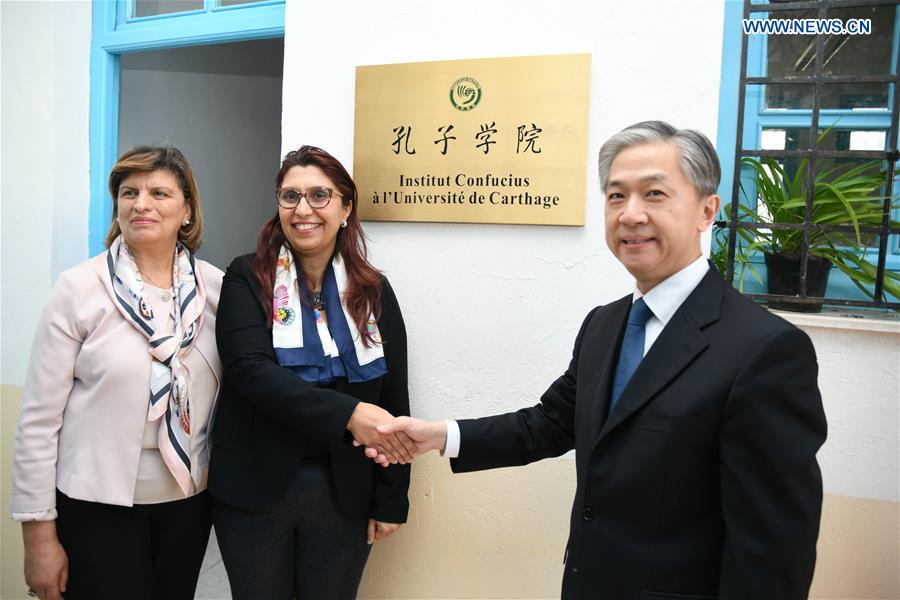
Chinese Ambassador to Tunisia Wang Wenbin (R) shakes hands with Olfa Ben Ouda, president of the University of Carthage, during the opening ceremony of Tunisia's first Confucius Institute in Tunis, Tunisia, on Nov 12, 2018. (Xinhua)
The delivery of plaques to 10 new Confucius Institutes at the opening ceremony of the 13th Confucius Institute Conference in Chengdu, Sichuan province, on Tuesday, means that 30 new Confucius Institutes have been built this year.
The 10 new Confucius Institutes are in Dominican Republic, Mauritania, Comoros, Sao Tome and Principe, Antigua and Barbuda, Papua New Guinea, Palestine, El Salvador, and Burkina Faso, the Confucius Institute Headquarters (Hanban) said.
There have been 548 Confucius Institutes, 1,193 primary and high school Confucius Classrooms and 5,665 teaching sites established in 154 countries and regions. A total of 47,000 full-time and part-time teachers from China and other countries teach 1.86 million students with various academic backgrounds face to face, as well as 810,000 registered online students.
In 54 countries involved in the Belt and Road Initiative, there are 153 Confucius Institutes and 149 primary and high school Confucius Classrooms, the headquarters said.
The two-day conference, sponsored by the headquarters and the Sichuan provincial government, and organized by Sichuan's Education Department and the Chengdu city government, drew more than 1,500 participants including university presidents and representatives of Confucius Institutes and Confucius Classrooms from more than 150 countries.
The Confucius Institute at the University of Sheffield in the United Kingdom has nearly 200 classes and 14,000 people have learned Chinese there, the university's former vice-chancellor, Keith Burnett, said at the opening ceremony of the conference.
Confucius Classrooms in Africa, Europe, Asia and America have taught tens of thousands of children, he said, and the Chinese teachers and staff of Confucius Institutes are excellent folk ambassadors, enabling people in communities from different parts of the world to feel China's friendliness and dedication.
As well as teaching children and students Chinese, the Confucius Institute at the University of Sheffield cooperated with local companies in dealing with challenges facing all humanity such as healthcare and industrial efficiency, he said.
Isaac Meroka Mbeche, deputy vice-chancellor of the University of Nairobi, Kenya, is director of the university's Confucius Institute, which offers a program teaching students Chinese and practical skills suited to the Belt and Road Initiative.
Some 20 graduates are contributing to the smooth operation of the Mombasa-Nairobi Standard Gauge Railway as drivers, maintenance workers and attendants, he said.

